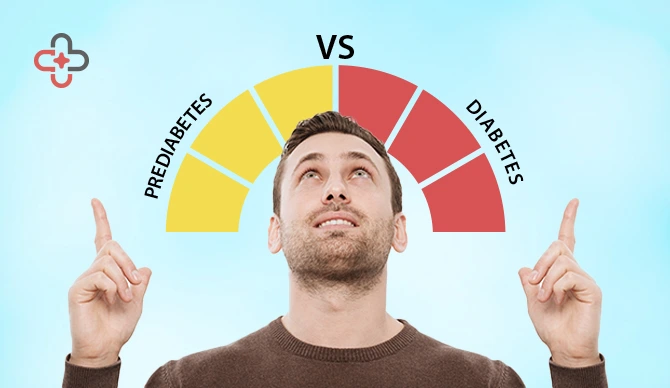Are you worried about your blood sugar levels but unsure if it’s prediabetes or diabetes? Knowing the difference can be the first step toward better health.
Both prediabetes and diabetes involve elevated blood sugar, but they differ in severity and what that means for your health. Recognizing the early warning signs can help you take action before things get serious. At Manhattan Primary Care, we’re committed to helping you understand these conditions and guide you toward effective management.
What Is Prediabetes?
Prediabetes is a condition where your blood sugar levels are higher than normal but not yet high enough to be diagnosed as diabetes. Think of it as a yellow flag, a warning sign that your body is starting to have trouble managing glucose.
Prediabetes Blood Sugar Levels
- Fasting blood sugar: 100 to 125 mg/dL
- Oral glucose tolerance test: 140 to 199 mg/dL (2 hours after a sugary drink)
- HbA1c (average blood sugar over 3 months): 5.7% to 6.4%
These numbers indicate insulin resistance, meaning your body struggles to use insulin effectively.
Risk Factors for Prediabetes
- Family history of diabetes
- Being overweight or obese
- Physical inactivity
- Age over 45
- High blood pressure or high cholesterol
Pre Diabetes Symptoms
Prediabetes often has no clear symptoms but can include:
- Increased thirst
- Fatigue
- Slightly blurred vision
Many people discover it only through routine blood tests, which is why regular health screening at clinics like Manhattan Primary Care is so important.
How Does Diabetes Differ From Prediabetes?
Diabetes means blood sugar levels are consistently higher and require more chronic disease management.
Types of Diabetes: Type 1 vs Type 2
- Type 1: Autoimmune destruction of insulin-producing cells; requires insulin injections.
- Type 2: Insulin resistance and deficiency, often linked to lifestyle factors.
Diabetic Levels vs Prediabetes Levels
- Fasting blood sugar: 126 mg/dL or higher
- Oral glucose tolerance test: 200 mg/dL or higher
- HbA1c: 6.5% or higher
Higher levels indicate diabetes, with greater risks for complications that require close monitoring, which our team at Manhattan Primary Care can help manage.
Warning Signs and Symptoms: Prediabetes vs Diabetes
Diabetes Symptoms
- Excessive thirst and hunger
- Frequent urination
- Weight loss without trying
- Fatigue
- Blurred vision
- Slow healing wounds
- Numbness or tingling in limbs
Prediabetes Symptoms
- Usually mild or none, making regular screening vital.
Gestational Diabetes Warning Signs
- Usually asymptomatic but diagnosed during pregnancy screening. Women can get support through women’s health services at Manhattan Primary Care.
Managing and Treating Prediabetes
The good news: prediabetes is reversible!
How to Treat Prediabetes
- Diet: Emphasize whole foods, vegetables, lean protein, and low sugar.
- Exercise: At least 150 minutes per week of moderate activity.
- Weight Loss: Even 5-7% body weight loss improves insulin sensitivity.
- Medication: Sometimes metformin is prescribed.
At Manhattan Primary Care, we work with you to develop personalized plans that fit your lifestyle, including specialized weight management programs, to help prevent progression to diabetes.
Preventing the Progression From Prediabetes to Diabetes
Early diagnosis and lifestyle changes are key:
- Routine blood sugar monitoring through lab services
- Healthy eating habits
- Regular exercise
- Working closely with your healthcare provider
Our team at Manhattan Primary Care emphasizes the importance of regular checkups and ongoing support to keep your blood sugar in check. For convenience, telehealth services are also available for ongoing care and advice.
Mental and emotional well-being can impact your diabetes management too. That’s why we offer mental health support to help you stay motivated and balanced.
Conclusion
Understanding prediabetes vs diabetes helps you take control of your health. Early action can prevent or delay diabetes and its complications.
If you’re concerned about your blood sugar levels, schedule a checkup with the trusted team at Manhattan Primary Care today. Early steps make all the difference!
Frequently Asked Questions
Can stress increase the risk of prediabetes or diabetes?
Yes, chronic stress raises hormones that can boost blood sugar and worsen insulin resistance.
Can you be at risk for diabetes with normal blood sugar?
Yes, risk factors like obesity or family history may put you at risk even if tests are normal.
How does poor sleep affect blood sugar?
Poor sleep disrupts insulin function, making blood sugar harder to control.
Does prediabetes affect men and women differently?
Yes, hormonal changes in women, like pregnancy or menopause, can impact blood sugar.
Can medications raise diabetes risk?
Certain drugs, such as steroids, may increase blood sugar and diabetes risk.
Disclaimer
This blog is for informational & educational purposes only and does not intend to substitute any professional medical advice or consultation. For any health-related concerns, please consult with your physician, or call 911.
